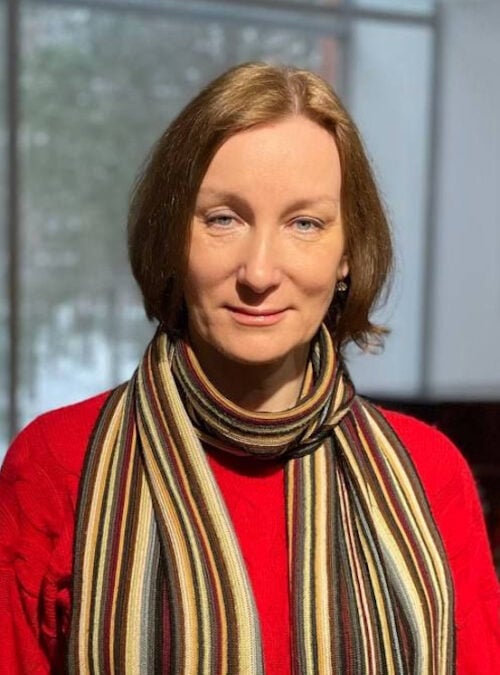“Every translation is a new translation”. Interview with Nathalie Bauer
Author: Thea Rimini

Seated at an old wooden desk, a series of elegant lithographs as her backdrop, this elegant lady answers our questions in a calm, yet friendly manner. Nathalie Bauer is one of the best-known translators from Italian into French, having translated more than 150 works. Her passion for Italian began when she was fifteen, teaching herself the language with L’italiano in 90 lezioni. She started translating as a career by chance, in easier times, when it was still possible to earn a living working on literary translations alone.
The first question, naturally, concerned her most recent translation, that of Antonio Scurati’s Strega Prize-winning M. Il figlio del secolo, which has become a literary phenomenon in France, too.
What’s the story behind the translation of M.?
Well, I must admit that I was rather surprised when they asked me to translate M. They found it very difficult to convince a publisher to come out with the book in France. French people do not know very much about the history of Italy, especially the period the book deals with. The idea they have of Mussolini is a grotesque, almost comic character, which is obviously not the case. I would never have guessed that the book would have become so successful both critically and in terms of its sales in France. I was truly astounded.
So what’s your explanation for this unexpected success?
I think that the key to the book’s success was the form Scurati gave the book. Rather than a traditional biography, it is a work of historical fiction, in which the form of the novel is accompanied by a series of documents at the end of each chapter attesting the validity of what has just been narrated. It is a brilliant idea and it captivated French-speaking readers, even those who know nothing about the history of Italy.
Talking about the translation itself, what were the greatest challenges you faced?
The biggest difficulties had nothing to do with the work’s historical nature. Of course, I had to check everything, but I studied history and had already worked on this specific period when translating Pennacchi’s Canale Mussolini. The biggest problem was style. At first glance, you don’t realise just how “elastic” Italian is as a language, while the structure of French is far more rigid. Translating between these two languages requires the use of a number of tricks you learn with experience. Additionally, there was a certain “pressure” as I knew I was translating a book that had caused a bit of a stir in Italy, dividing both readers and critics alike. I had never translated anything by Scurati and he was busy working on the second volume of his trilogy on Mussolini at the time, so it was difficult to get any feedback from him. Yet, I think that, in the end, I managed to recreate his voice, especially as I am now translating the second volume.
Scurati knows French pretty well – did he want to check the translation?
No, and, to tell you the truth, this was a big advantage for the translator. Authors often go looking for their texts in translations and feel they are unable to find them because the texts have been formulated in a different way. Even when you remain very close to the original, the way in which you render sentences, words, in the other language, will always be different, because the syntax is different. For translators, this is embarrassing, but normal. As I am also a writer, I couldn’t stop myself from comparing the translation with the original when my book was translated into Italian. As a writer, basically, there is not much you can do about this “anxiety”, this “concern” you feel in relation to your own work when it is translated.
You said that you were asked to translate M., but I imagine that on other occasions you have suggested books to publishers for translation. Can you tell us a little about how this works?
There are publishers who ask me to translate books, but I also work with Italian literary agencies and Italian publishing houses that send me books to have a look at. I also work directly with Italian authors, who send me their books. If I think that the book has something, I look for a publishing house here in France to publish it. It was different at the beginning, of course.
Can you tell us a bit about this beginning? How did you start working as a translator?
Well, to tell you the truth, it all started by chance. I was writing a dissertation on mediaeval history, on the Estense court in Ferrara, and started to become more and more interested in Italian literature. At the same time, I was asked to become a reader of Italian books for Plon – it was 1988. A couple of years later, they asked me to do some translations. I realised at once that this job really suited me, my reserved nature, and I realised how it could become a university career.
You have translated authors from the past, like Levi and Ginzburg, and also contemporary authors. Is there a different approach to translating a classic and translating a living author?
For me, every translation is a new translation. When I start translating a book, I always feel like I have never translated before. You cannot just rely on the experience you have accumulated over the years, even though, it’s true, the more you translate, the better you become. I love translating the classics and I have been lucky enough to translate De Roberto, Levi, Arpino, Ginzburg (Natalia) and Soldati. The more experienced the authors, the easier (and more pleasurable) it is to translate them. As for today’s writers, they are all different from one another, each book is different, and this presents lots of problems. But good translators must be able to translate everything, from classics to gender books.
You have translated both male and female writers. Does it make a difference for you, a woman, to translate a book written by a man or a woman? Is there such a thing as a “traduction femme”, as some people claim?
For me, writing does not have a gender. There is no such thing as female writing and male writing – just good writing and bad writing. And good or bad translations.
What is the secret of a good translation? Meschonnic used to say that what makes the difference between translations is not their interpretation, but the rhythm of the writing. Do you agree?
For me, a good translation is when readers have the impression that the book was written in that language, when they don’t realise that it is a translation. Then, all authors have their own specific demands. Marcello Fois (and I have translated several of his books), for example, always asks me to maintain the rhythm and colours of his writing, even at the cost of meaning, and I believe he is right. The language needs to be fluid and reproduce all the particularities it has in Italian. This, of course, does not mean that you don’t have to remain faithful to the text, but you do need to keep this sort of tiny “margin” to enable the translation to offer an equivalent of the original.
It is always a question of getting the right balance between the source text and its translation…
Rather than balance, I think it is more a question of “sensitivity” as regards the language. When you speak two languages, you immediately realise that you cannot say the same thing in the same way in the two languages. At the moment, for example, I am translating a crime story that takes place in Naples. I realised that if I remained too close to the original when translating the dialogues, they would sound very artificial in French, absurd. You have to reformulate them to make them credible in another language. It’s rather like a mathematical equation – you need to obtain the same result, but in a different way.
Does this Neapolitan novel you are translating contain any dialect?
No, not this book, but I generally find it very stimulating to translate dialects.
And how do you translate dialects? The translating of dialects is undoubtedly one of the major challenges facing translators of Italian literature.
There isn’t one single solution. All translators have their own way of tackling dialect. In France, the situation is different from Italy. In certain regions, they still speak dialect, but it is limited to certain social classes. In Italy, on the other hand, dialects are still very much alive, so you need to find a way of creating a sort of surprise among French readers. When Italians read expressions in dialect, even when they do not understand them, they still get the gist, so when you translate, you need to reproduce this surprise effect. I recently finished translating the second part of Canale Mussolini, which contains three different dialects. There is the dialect of the zone of Ferrara, where the characters come from, the dialect of Lazio, Pontinia, where the story takes place, and a bit Neapolitan. How do you render this variety? For the dialect that was most prevalent in the story, I invented words, lengthened words, shortened words. Basically, I tried to create a language that was, at the same time, both strange and, yet, understandable. For the dialect of Pontinia, on the other hand, I introduced interjections as a sort of linguistic tic. Finally, for the Neapolitan, I added a number of expressions. I always try to highlight the “poetic” side of a dialect. What I never do in translation is to render an Italian dialect with a French dialect, because socially and culturally these dialects would be very different from one another and I would be frightened of introducing foreign elements into an Italian context.
Have the resources available today on the Internet made the life of a literary translator easier?
The Internet has made our profession far, far easier, above all as regards quotations. For example, I can easily find a verse from the Divina Commedia without having to reread the entire work. The dictionaries of dialects you can find online have also speeded up the way I work, as beforehand I was always having to consult the authors for clarification.
Earlier you mentioned that you are also a writer. Nathalie Bauer has written five novels, one of which, Ragazzi di belle speranze, has been translated into Italian. Does your work as a translator, in a certain way, influence the way you write?
Translating and writing are two quite different activities. Translators must always remain in the shadows – they must disappear behind the author and their presence must not be felt.
Basically, the translator’s invisibility…
Well, yes. When you are writing, on the other hand, you must create everything, you must start from scratch and create your own voice. What does help me, however, between writing one novel and the next, is my work as a translator. It is almost as if, in a certain sense, I continue writing through the writing of others. So translating becomes a sort of training ground for writing. It is no coincidence that when Stefan Zweig was asked what you have to do to become a writer, he replied that you need to translate, because when you translate, you learn different ways of expressing yourself and this adds something extra to your writing..
Are you writing something at the moment?
I started working on a novel two years ago. Last year, I had numerous translations to do for the Salon du livre, where Italy was to be guest of honour in 2021 (it was recently decided to postpone Italy’s participation until 2022). This year, I may have a bit more time …
Do you have a specific method of translating?
Translation work is a long process. When you start, you think you have lots of time available, but then you keep having to reread text, sometimes fifty times, and, at a certain point, I have to set myself a specific number of pages to translate every day. But translating is not an exact science: there are days when you find it far easier to translate and others when you find it far less so. The most enthralling thing about translating is precisely this: that degree of uncertainty that characterises it. You never know what kind of problems you are going to face, the difficulties you are going to have to deal with. It is a constant challenge, full of unknowns.










